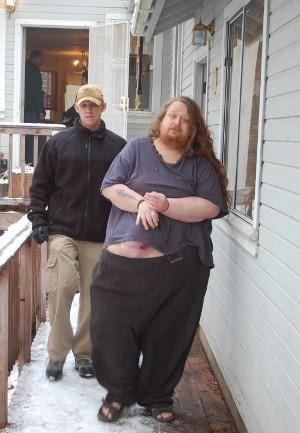- Ross A. Christensen
- Posted On
Foodie Freak's April events
April 2: Monday Blues, The Blue Wing, Upper Lake. 6:30 p.m. to 9 p.m. Blues Farm with Dave Broida will perform. 707-275-2244.
April 3: Girls Just Wanna Have Wine, Wildhurst Vineyards Tasting Room, Kelseyville. 5 p.m. to 9 p.m. Admission is $5, women only. Theme for the evening is “The Best Eyewear,” come with your fanciest glasses on. 707-279-4302.
April 3: Wine tasting and photography art show. Lake County Wine Studio, Upper Lake. 5 p.m. to 8 p.m. Dusinberre wines will be poured by winemaker Jeff Smith and the photography of Jim Warren will be on display.
April 3: Meet the Winemaker, The Blue Wing, Upper Lake. 6 p.m. to 9 p.m. Mike and Adawn Wood will be pouring Shed Horn Wines.
April 3: Fondue Fridays, Lake County Wine Studio, Upper Lake. Begins at 6 p.m. Cheese fondue available with wine. 707-275-8030.
April 4: Wine tasting and photography art show. Lake County Wine Studio, Upper Lake, 4 p.m. to 7 p.m. Dusinberre wines will be poured by winemaker Jeff Smith and the photography of Jim Warren will be on display.
April 5: Wine and cheese open house at the Villa Andrea, Clearlake. 11 a.m. to 2 p.m. Come visit the newest addition to Lake County’s wine industry. RSVP to This email address is being protected from spambots. You need JavaScript enabled to view it. or 707-994-4000.
April 5: Sunday Brunch in the Garden, The Blue Wing, Upper Lake. Brunch served from 10 a.m. to 3 p.m. Colby Houston on guitar and vocals, 11:30 a.m. to 2 p.m. 707-275-2244.
April 5: All About Shrimp, Chic Le Chef, Hidden Valley Lake. 2 p.m. to 4 p.m. Demonstration class. RSVP or for more information: 707-987-9664.
April 6: Monday Blues, The Blue Wing, Upper Lake. 6:30 p.m. to 9 p.m. Will Seigel & Friends will perform. 707-275-2244.
April 8: Spring Salad Bar Luncheon. Park Study Clubhouse, Clearlake. 11:30 a.m. to 1:30 p.m. Benefit for Park Study Club. Admission is $60. Info: 707-995-1807 or This email address is being protected from spambots. You need JavaScript enabled to view it..
April 10: Fondue Fridays, Lake County Wine Studio, Upper Lake. Begins at 6 p.m. Cheese fondue available with wine. 707-275-8030.
April 12: Sunday Brunch in the Garden, The Blue Wing, Upper Lake. A special Easter brunch will be served from 10 a.m. to 3 p.m. Front Porch Blues with Ed Hance, 11:30 a.m. to 2 p.m. 707-275-2244.
April 13: Monday Blues, The Blue Wing, Upper Lake. 6:30 p.m. to 9 p.m. Blues Farm with Dave Broida will perform. 707-275-2244.
April 15: A Wine Adventure Dinner, The Saw Shop, Kelseyville. Begins at 6 p.m. A six-course meal featuring wine pairings with sommelier Stephanie Green, owner of Focused On Wine. A fun, informative evening. $60 per person, tax and tip are included. 707-278-0129.
April 17: Fondue Fridays, Lake County Wine Studio, Upper Lake. Begins at 6 p.m. Cheese fondue available with wine. 707-275-8030.
April 19: Sunday Brunch in the Garden, The Blue Wing, Upper Lake. Brunch served 10 a.m. to 3 p.m. Michael Barrish on guitar and vocals, 11:30 a.m. to 2 p.m. 707-275-2244.
April 20: Monday Blues, The Blue Wing, Upper Lake. 6:30 p.m. to 9 p.m. Memphis Exchange with Randy McGowen will perform. 707-275-2244.
April 24: Concerts with conversations, Tallman Hotel, Upper Lake. Wendy DeWitt and her boogie woogie piano style. Appetizers, dessert, coffee will be served, in addition Joey Luiz will pour wines from Shannon Ridge Vineyards. $40 Tickets to this event can be obtained by calling the Tallman Hotel reception desk at 707-275-2244.
April 24: Fondue Fridays, Lake County Wine Studio, Upper Lake. Begins at 6 p.m. Cheese fondue available with wine. 707-275-8030.
April 25: Spring Wildflower Brunch, Clearlake State Park, Kelseyville, 9 a.m. to noon. RSVP requested, 800-525-3743. Fill-your-own omelet brunch and pastries is the opening part of the annual Blue Heron Festival. The festival continues throughout the weekend.
April 25: Oregon Chai Tea Contest, Chic Le Chef, Hidden Valley Lake. 1 p.m. to 5 p.m. Entries accepted through April 15, call store for details and entry forms. Finalists will prepare their various recipes containing Oregon Chai Tea and present for judging. 707-987-9664.
April 26: Sunday Brunch in the Garden, The Blue Wing, Upper Lake. Brunch served from 10 a.m. to 3 p.m. Sarah Tichava on guitar and vocals, 11:30 a.m. to 2 p.m. 707-275-2244.
April 27: Monday Blues, The Blue Wing, Upper Lake. 6:30 p.m. to 9 p.m. Bottle Rock Blues Band with Mike Wilhelm will perform. 707-275-2244.
Ongoing activities
The New Cool at Konocti Harbor featuring David Neft
Konocti Harbor hosts “The Piano Man” David Neft, playing the grand piano from 6 p.m. to 9 p.m., every Friday and Saturday in the relaunched dining room. www.konoctiharbor.com
Langtry Estate and Vineyard Tours, Middletown
Langtry Estate and Vineyard is offering exciting and innovative tour programs. Guests ride in battery-operated Global Electric Motorcars. Tours are offered Tuesday through Saturday. The Tephra Vineyard Lunch Tours are offered at 11 a.m. and 1 p.m. $40 per person includes lunch and wine tasting. 21000 Butts Canyon Road. Reservations required 24 hours in advance. Info: 707-987-2385.
Tuscan Village Friday Concert Series, Main Street, Lower Lake
Live music, food, wine tasting. Presented by 2Goombas and Terrill Cellars. 5:30 p.m. to 8:30 p.m. Info: 707-994-3354.
Beer Master Dinner Series
Molly Brennan’s 175 N. Main St., Lakeport. Second Tuesday of each month, 6:30 p.m. to 9:30 p.m. Different brewery featured each month, with beers paired with each course of a five-course meal including dessert. Advance reservations required. Info: 707-262-1600.
If you have a food or wine related event and would like to have it listed in the coming months, call Ross Christensen at 707-998-9550.
{mos_sb_discuss:2}

 How to resolve AdBlock issue?
How to resolve AdBlock issue? 








